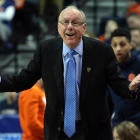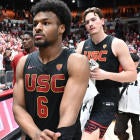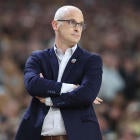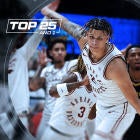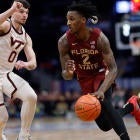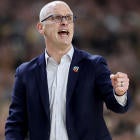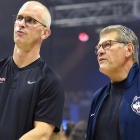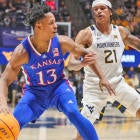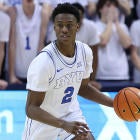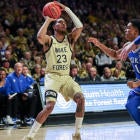Their names are John A.R. Scott, Edmund Dollard, Lewis Andreas, Marc Guley, Fred Lewis and Roy Danforth.
Six Syracuse forefathers to the godfather of Cuse hoops.
Those are the only permanent coaches in Syracuse men's basketball history outside of James Arthur Boeheim. The aforementioned half-dozen combined for 949 wins from 1903-1976.
Boeheim alone beats them all.
Syracuse has won 1,027 games with Boeheim as coach (with 101 of those victories officially taken off the books due to NCAA sanctions, so Syracuse must acknowledge his current total as 926). If you factor in his seven seasons as an assistant to Danforth and his four years as a player from 1962-66, Boeheim has spent almost 54 of his nearly 74 years on earth at Syracuse and been involved in 1,668 games -- that's more than half of the 2,878 games in school history.
And 1,218 of those games with Boeheim on the court or on the bench have ended in a Syracuse victory.
That amounts to a fantastic .730 win percentage.
Boeheim does not have a parallel in major college athletics. There has never been Division I coach in men's basketball, women's basketball or football who has spent more than 40 years at their alma mater and never coached anywhere else. Boeheim's the only one. There is no coaching figure more synonymous and literally affiliated with only one school. Mike Krzyzewski played and coached at Army before he got to Duke. The same is true of Dean Smith at Kansas prior to his reign at North Carolina. Also true of John Wooden, who starred at Purdue and coached at Indiana State long before he retired as the Wizard of Westwood at UCLA.
Even Adolph Rupp, who spent 42 years coaching Kentucky, wasn't a UK alumnus; he played at Kansas.
But for Boeheim, who has won more games in Division I men's basketball than everyone except Krzyzewski, it's always and only been Syracuse.
And unlike with Krzyzewski, there's been continual retirement talk in the past six-to-seven years regarding Boeheim. That dialogue has been prompted by a few things, including the Bernie Fine scandal and the myriad NCAA violations that brought about significant sanctions and a yacht load of vacated wins.
CBS Sports is running a six-part series on the half-dozen men's college basketball teams that have active Hall of Fame coaches leading their respective programs. We're examining each coach and school's situation, how and when they might leave their posts, and reasonable candidates who could succeed them. This is more than a guessing game on who's next; the series is taking a big-picture look at the unique challenge facing each of the six schools. Here, we look at Syracuse LAB: Life After Boeheim.
A practical forecast for retirement
Syracuse, which is coming off Final Fours in 2013 and 2016, has remained nationally relevant and managed to dodge significant hits to its overall reputation in wake of the negative publicity and NCAA penalties that came from one of the longest investigations in that organization's history.
Because of the tumult that seized Syracuse's program through much of the 2011-2015 period, Boeheim and SU brass organized a plan of succession and plotted out his egress. In 2015, longtime assistant Mike Hopkins was officially named coach-in-waiting and Boeheim's intention was to retire following the 2017-18 season.
Then things broke in Boeheim's favor, which is to say factors that extended his tenure fell into place. Syracuse made a shocking run to the 2016 Final Four, which made Hopkins all the more appealing to a few schools of note. Washington wound up hiring him (practically in the cover of darkness; few realized he was even interviewing for the job). Most importantly Boeheim's son, Buddy, turned into a legitimate Division I prospect.
This pushed the Boeheim retirement timeline back and, theoretically, corresponds with the resolution to Buddy's college career. It's unknown whether or not Buddy is going to redshirt the upcoming season. If he doesn't, he'll be on track to complete his college playing career in 2022. If he does, 2023. So the timeline (again) seems clear. Boeheim would be either 77 or 78 and one of the oldest Division I coaches in history at that point. Either way, Boeheim opting to retire in the same year that his youngest son finishes at Syracuse would be quite the storybook ending for him.
Age | 73 |
Seasons | Entering 43rd season at Syracuse |
Career record | 926-368 (Does not include 101 victories vacated by the NCAA) |
NCAA Tournaments | 33 |
Final Fours | 5 |
NCAA titles | 1 |
Hall of Fame induction | 2005 |
Top candidates to replace Jim Boeheim
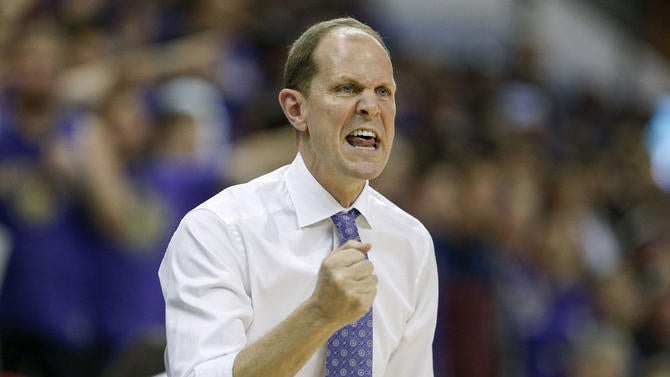
1. Mike Hopkins
Currently: Coach at Washington
Résumé: With one season under his belt as a head coach, Hopkins has a 21-13 mark at UW. He also owns a 4-5 record at Syracuse from 2015-16, when he coached nine games while Boeheim sat out due to NCAA suspension. The 48-year-old Hopkins finally took a job, after turning down previous offers elsewhere, once it was clear that Boeheim wasn't going to stick to his previous retirement timeline.
Why it could be him: For a decade, Hopkins was casually acknowledged as Boeheim's pick-in-waiting to succeed him. That officially became true in 2015. So there's easy reason to call him the leader at this point. If Washington can make a couple of NCAA Tournaments between now and when Boeheim retires, Hopkins is going to have a decided edge.
Why it wouldn't be him: One thing to consider with Hopkins is his original West Coast ties and the possibility that Washington gets good enough that he opts not to return to the blistering, cold winters of central New York. Seattle has much more talent annually on average than the greater Syracuse/Rochester/Buffalo area -- and the Pac-12 is an easier league than the ACC -- so you could make a good case for Hopkins to stay put if Washington is thriving a few years from now.
2. Adrian Autry
Currently: Associate head coach at Syracuse
Résumé: Autry has no head coaching experience. As a player, he was a McDonald's All-American in 1990 and graduated from Syracuse in 1994. His career assists (631) and steals (217) are fifth and sixth respectively in SU history. Since he joined Cuse as an assistant, the team is unofficially 175-75 (some wins were later vacated due NCAA violations) with trips to the Final Four in 2013 and 2016.
Why it could be him: The top three candidates on this list all played for Boeheim. In that way, Syracuse is strikingly similar to the succession plan that's probably going to play out at Duke. With Hopkins on the other side of the country, Autry is best positioned to inherit the program when Boeheim leaves. He's been on staff since 2011.
Why it wouldn't be him: The only way Autry (46 years old) wouldn't get the job is if Hopkins was picked over him or if a significant name elsewhere, someone with a lot of success as a head coach, was offered the job by Syracuse. Both of those scenarios are plausible, but at this stage, Autry is in a good spot. It's hard to hold his lack of head coaching experience against him; Hopkins was in the same position, albeit having served much more time as an Orange assistant, when he was tabbed as the heir apparent.
3. Gerry McNamara
Currently: Assistant coach at Syracuse
Résumé: Like Autry, McNamara has never been a head coach. All the accomplishments attached to Autry above apply to McNamara, including a 34-3 record and No. 1 seed in the NCAAs in 2011-12 ... which was later wiped off the record books by the NCAA.
Why it could be him: McNamara is a favored son of the region. He's one of the most decorated and celebrated players in program history, having played a pivotal role on Syracuse's one and only national championship team in 2003. While he's certainly below Autry in the pecking order right now, if Autry were to take another job before Boeheim retired, McNamara would have a fair shot at taking the throne. If Boeheim retires in four years, McNamara would be 39 at that point with over a decade's worth of experience as a Syracuse assistant.
Why it wouldn't be him: He's almost certainly guaranteed to be the youngest candidate in consideration. You combine that with the probable chance he won't have any head coaching experience to his name, and that could be what holds him back.
4. Rob Murphy
Currently: Coach at Eastern Michigan
Résumé: Murphy, who turns 45 on Sept. 19, has a 129-110 record with the Eastern Michigan Eagles. He's been in charge of the program since 2011 but is yet to make an NCAA Tournament. His 2017-18 team was arguably his best. Murphy was an assistant at Syracuse from 2004-11. He played at Central State, a Division II HBCU in Wilberforce, Ohio.
Why it could be him: Of all the coaches with Syracuse ties who will have a shot at an interview, Murphy's going to have the most experience running a program. If he can make the NCAA Tournament once or twice in the coming years, it would be a huge boost to his candidacy.
Why it wouldn't be him: If Murphy plateaus at EMU and doesn't make the NCAAs, it's going to be a harder sell than going with an Autry or McNamara, because even if those guys don't have head coaching experience, they bring hope of what might happen. Syracuse will want to prove its stature goes beyond Boeheim's reputation, and hiring a coach from a mid-major conference without any March success would fall short of that ideal.
5. Billy Donovan
Currently: Coach of the Oklahoma City Thunder
Résumé: The greatest basketball coach in the history of the University of Florida, Donovan won consecutive national titles in 2006 and 2007. He made the Final Four four times and has 502 wins vs. 206 losses in college. He was at Florida from 1996-2015, when the NBA finally lured him out of college hoops. Since getting to Oklahoma City, Donovan's 150-96 (a .610 win percentage; his college clip is .709) and made the NBA Playoffs all three years, though OKC's lost in the first round the past two seasons.
Why it could be him: The 53-year-old Donovan is originally from New York, albeit he grew up on Long Island. He's done OK for himself in the pros, but the reality is if he felt a pull back to college basketball, almost any program would take him. Donovan's listed last here because the timing would have to be just right. He'd have to leave Oklahoma City either the same year or the year before Boeheim retired. If that happened, and he wanted to give college a go again, Syracuse would almost certainly try to land him. If that scenario played out, there wouldn't be a candidate who could compete with Donovan's credentials.
Why it wouldn't be him: First, he's not a Syracuse guy. If Boeheim is going to have a significant say in this (and, honestly, it feels like the choice is going to be his behind the scenes), he's likely to lean in on someone who has direct ties to Syracuse. After all, Boeheim is an alumnus and has given his life to that university. He probably wants to bestow it to someone that knows what it's like to live in Syracuse and work inside the program. Donovan doesn't. Aside from that, Donovan wouldn't be under strong consideration if his NBA career hits an upward trajectory in the years to come, but that basically goes without saying.
The takeaway
Boeheim and Krzyzewski are close friends. You have to believe they've had conversations about their own careers and how they expect or hope to have to torch passed whenever they move on.
There's also, from the outside at least, the obvious acknowledgement that the two are pushing each other into their mid-70s. Krzyzewski outpaces Boeheim in wins, but if Coach K opts to retire before Boeheim, you can bet that Boeheim would love to catch his old buddy in Ws -- even if unofficially. He doesn't give a damn about what the NCAA considers to be official victories.
Syracuse is different from Duke, though. The Duke job is considered unequivocally a top-three gig in college basketball. Syracuse? It's in that top-20 territory. No one really knows how good it is beyond what Boeheim's constructed. Krzyzewski built up Duke, sure, but that was a program with deep ACC ties and real NCAA Tournament success prior to K's arrival. The same wasn't true of Syracuse, so a closer comparison for SU would be UConn. The Huskies and Orange developed a fevered rivalry from the late 1980s and into the early 2010s -- before realignment splintered the Big East and sent Syracuse off to the ACC.
I can't help but wonder if Boeheim looks at what's happened to UConn since Jim Calhoun left. The Huskies won a national title under Kevin Ollie (with Calhoun's players, as a No. 7 seed), but the program undeniably and drastically slipped in stature from what it was in Calhoun's final years to what it is now with Dan Hurley heading up the overhaul. In a tougher conference, but with more advantages, can Syracuse sustain its standing after Boeheim? If so, which candidate makes the most sense to keep the Orange as a top-25 program?
This is the biggest question facing that athletic department, and Boeheim, in the years to come. Coaches hand-picking their successors has not proven to be a failsafe management tactic. But most in the industry believe it's unlikely Boeheim will have his top choice vetoed.
Just as important as who comes after Boeheim is what comes next for Syracuse in the ensuing three or four years. At a major program, entry point can mean a lot, and it's much easier to operate if you're taking over after consecutive NCAA Tournament appearances and with some NBA picks having recently left campus. Syracuse is going to go from having been led by one man for nearly five decades to giving the reigns to an unknown. There is no preparing for that -- because we've literally never seen it before at this level in college basketball.













